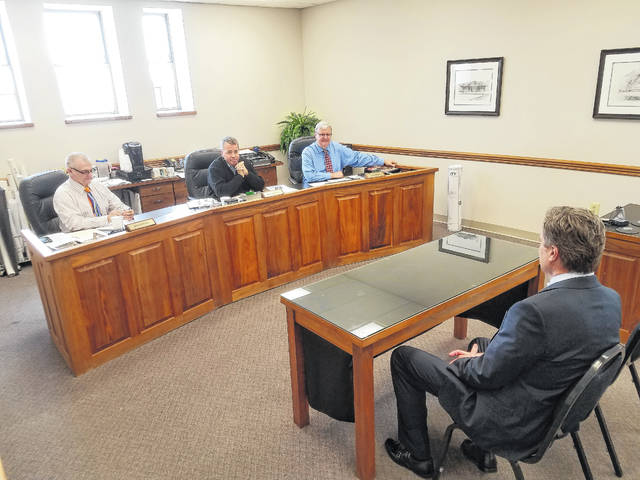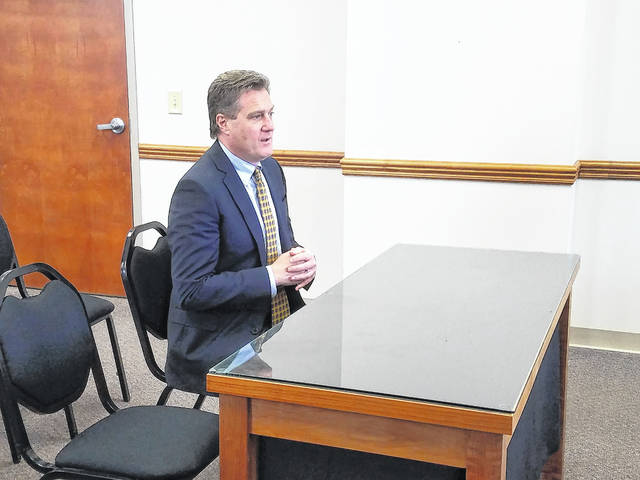

Congressman Mike Turner (R-10th District) visited the Fayette County Commissioners Monday afternoon to discuss finances, the opioid epidemic and other issues facing the community.
Turner began by thanking the commissioners for taking time out of their lives to dedicate to public service. He said the work they do serves the future and if anyone wants to find people thinking about the future, they should look no further than local government.
Turner then shifted the conversation to Medicaid coverage and how it impacts people in the jail system suffering from opioid addition.
“One issue we have talked about before when I was touring Greene County’s jail, they brought forward the issue of when someone is Medicaid eligible and becomes incarcerated, they lose these benefits,” Turner said. “When I visited here last time we talked about your experience with that also is the same. You lose the opportunity to access funds that could be used to provide treatment for individuals. That is the time when we have the ability to impact someone’s life, when we have custody of them.”
The Congressman said when these individuals leave the jail and their Medicaid coverage kicks back in, the chance to directly impact the decision-making of the addicted to help them choose to find treatment is gone. Turner said he attempted to help this situation by putting a bill forward that extends coverage to Medicaid eligible individuals while they are incarcerated for the purpose of treatment.
“Just last year, at the end of the year, President Donald Trump’s commission on the opioid addiction issued a recommendation that this change be made,” Turner said. “So momentum is in our favor. They made a recommendation that the change be made administratively, because they can make the change on their own. We dropped the bill because obviously by legislation we can compel them to. But they are undertaking that review and are coming to the same conclusion as we did, and I think that bodes well for a change.”
Another issue Turner discussed was the amount of babies being born to heroin users and how that has caused a plethora of other problems. He said working with the Premiere and Kettering health networks, they identified a need for a special unit for babies born addicted to heroin. With the need for more direct care, a quiet environment and more intensive nurse interactions, Turner said a hospital is not the place for such treatments.
“In Montgomery County they opened what is known as Brigid’s Path, which is a joint non-profit the community is funding to more effectively transition these newborns,” Turner said. “The director of health and human services just visited and he was astonished to learn that Medicaid funds were not available to help fund the treatment for those newborns, but 60 percent of all babies born in Ohio are born on Medicaid.”
The Congressman next turned his attention to their efforts to help the foster child population. One issue they have found is federally created homelessness due to two separate organizations not working in conjunction; foster care taken care of by the U.S. Department of Health and Human Services and adult housing assistance taken care of by the U.S. Department of Housing and Urban Development (HUD).
“These children are placed in a situation as they reach adulthood where they are federally created homeless,” Turner said. “We are trying to streamline that process of the hand-off. Once they turn 16 in foster care and we know they are going to age out of the system, we are setting up a system that would permit those individuals to register with the local housing authority for the purposes of planning two years out for housing assistance.”
The commissioners then took time to address with Turner some of the issues the county faces.
The first of these is the rise in children within the foster system and its impact on the budget. The amount of children has more than doubled within the Fayette County system, according to commissioner Dan Dean. Dean said the three commissioners have heard of surrounding counties also needing to dig into their funds to pay extra money for these services. Turner then asked if this rise in children within the system is due to the opioid epidemic.
“Yes,” Dean said. “Basically, it is creating orphans because there is no one to take care of them. (Because these kids come from such backgrounds and require special treatment) they are higher cost because a lot of them won’t fit into a foster care home, you have to send them to a treatment facility. Some of them, in our case, are as far away as Steubenville or Lawrence County, for special needs kids. This greatly increases the cost, not only because of the cost of the care, but we still have to do visits from this county.”
The commissioners also discussed the recent changes to Medicaid managed care and sales tax within the state and its impact on the local budget. Currently, besides the more than $600,000 lost, the commissioners have estimated an additional loss of around $1 million this year. Though the dependence on the sales tax has lowered over the years, a good portion still factors into the financial state of the county.
This is important for a number of reasons, but one of the issues mentioned to Turner is now the county is going to go to the voters to pay for services related to the hospital and EMS within the county. Commissioner Jack DeWeese said maybe they should have come to the voters sooner, but they have always been able to budget and pay for these important services with money available.
With the aforementioned changes to the sales tax, the hospital being penalized for EMS not being deemed “critical access” and other financial factors, the money to continue to support a county-wide EMS service is dwindling. The commissioners voiced these concerns to Turner, who said he would begin looking into these problems, as they believe the county-wide system is crucial to maintaining a good emergency management service.
Issues aside, the commissioners thanked Turner and his office for working so well with them over the years. They additionally commented on the changes to Medicaid eligibility for the incarcerated, saying it will greatly help the county.
Stay with the Record-Herald for more coverage of the Fayette County Commissioners. For more information contact The Fayette County Commissioners’ Office, located at 133 S. Main St., suite 401 in Washington Court House. Their office hours are Monday through Friday, 8 a.m. to 4 p.m. and they can be reached at (740) 335-0720.



